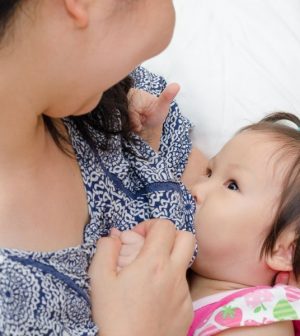- Recognizing the Signs of Hypothyroidism
- 10 Strategies to Overcome Insomnia
- Could Artificial Sweeteners Be Aging the Brain Faster?
- Techniques for Soothing Your Nervous System
- Does the Water in Your House Smell Funny? Here’s Why
- Can a Daily Dose of Apple Cider Vinegar Actually Aid Weight Loss?
- 6 Health Beverages That Can Actually Spike Your Blood Sugar
- Treatment Options for Social Anxiety Disorder
- Understanding the Connection Between Anxiety and Depression
- How Daily Prunes Can Influence Cholesterol and Inflammation
Breastfeeding Moms Get Mixed Messages When Baby Has an Allergy

Breastfeeding mothers whose babies have food allergies often get conflicting advice from doctors on whether they should change their eating habits, according to a new study.
“We found that guidance from health care practitioners for breastfeeding mothers in this situation was inconsistent,” said study lead author Dr. Hannah Wangberg, an allergist-immunologist in San Diego.
“Of the 133 mothers who completed the survey, 43% were advised to continue breastfeeding without dietary restriction and 17% were advised to avoid eating the food(s) their child was allergic to while breastfeeding,” Wangberg said in an American College of Allergy, Asthma and Immunology news release. “A minority of the mothers (12%) reported their child experienced an allergic reaction to breast milk.”
But nearly 3 in 10 of the mothers received no guidance on whether they could eat the food their child was allergic to, according to the study.
More than 30% of the mothers in the survey said they received conflicting advice from their health care providers on what they should or shouldn’t eat while breastfeeding their food-allergic child.
The survey didn’t ask the mothers whether conflicting advice came from an allergist or primary care provider. None of the mothers was told to stop breastfeeding entirely.
“There is no uniform guidance I’m aware of on this topic, which is perhaps one reason for the confusion. That’s in part because there is not a lot of good data available,” said Dr. Jay Lieberman, chair of the college’s food allergy committee. “That said, there is little evidence that if a mother eats a food that the child is allergic to, that this will lead to a reaction in the child.”
If a food allergy emerges, Lieberman advises breastfeeding mothers to continue nursing and eating what they want. But, he added, it’s also fine if they’re more comfortable avoiding the child’s allergen while continuing to breastfeed.
Of the 89% of mothers who kept breastfeeding after their child’s food allergy diagnosis, almost half continued to eat the food their child was allergic to on a regular basis (more than once a week) and did not change how they provided breast milk to their child.
Another 25% continued to eat the food their child was allergic to on an infrequent basis (less than once a week) without altering how they provided breast milk to their child.
The findings were published recently online in the Annals of Allergy, Asthma and Immunology.
More information
The American Academy of Pediatrics has more on infant allergies and food sensitivities.
SOURCE: American College of Allergy, Asthma and Immunology, news release, March 4, 2021
Source: HealthDay
Copyright © 2026 HealthDay. All rights reserved.










